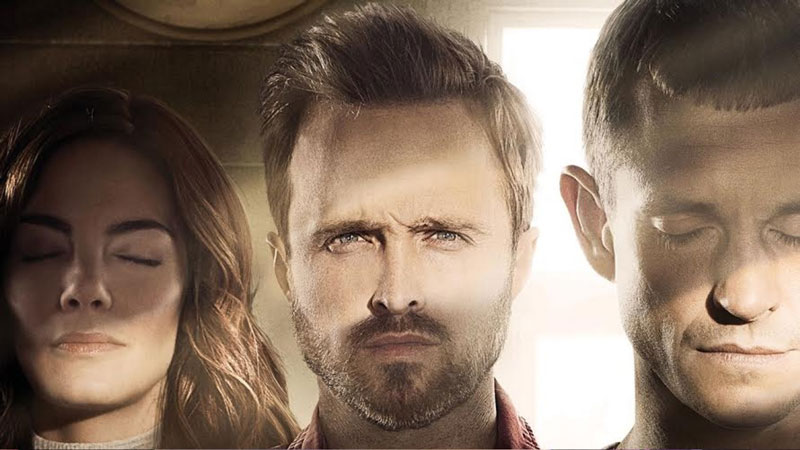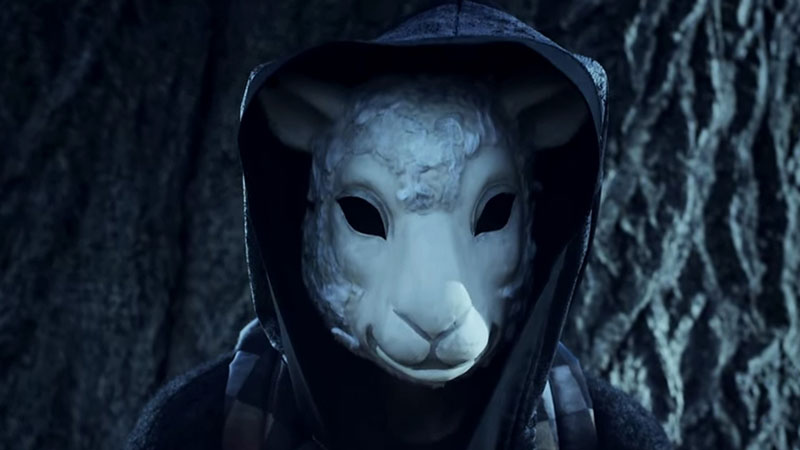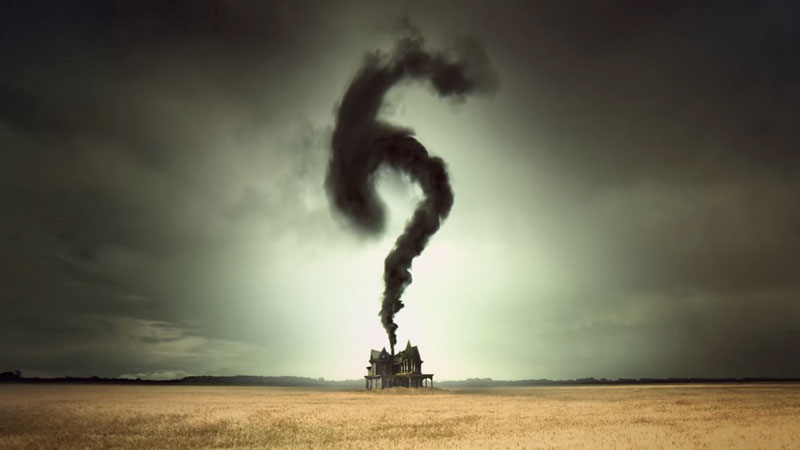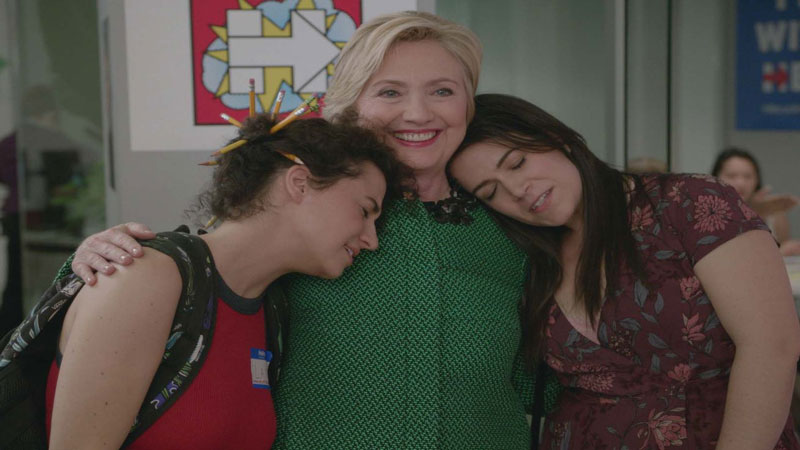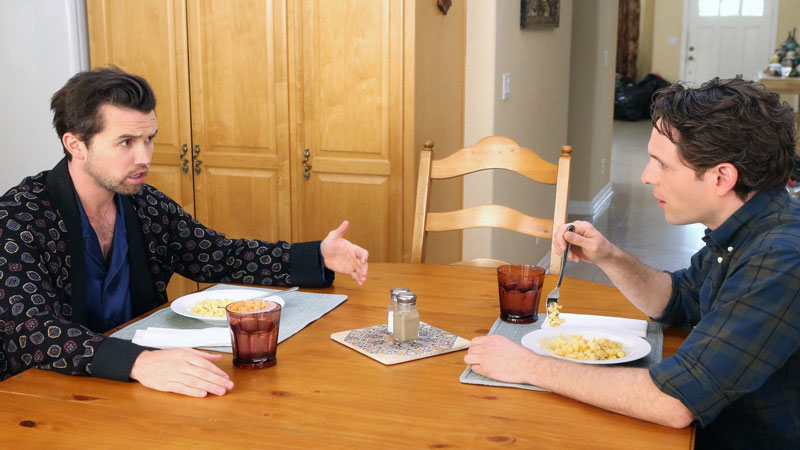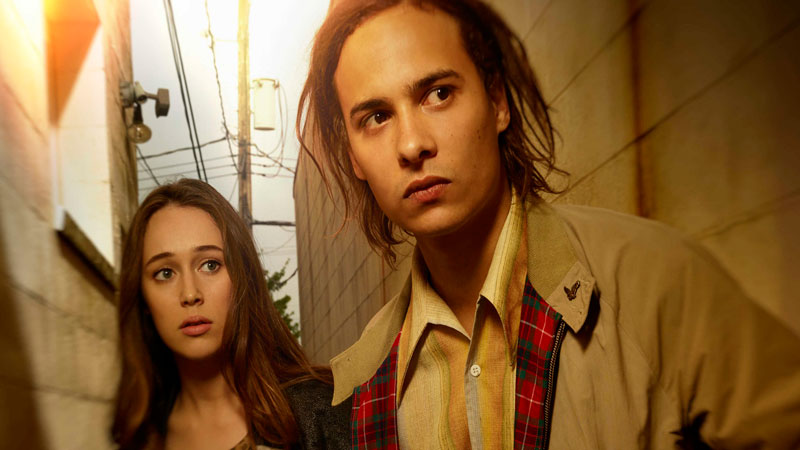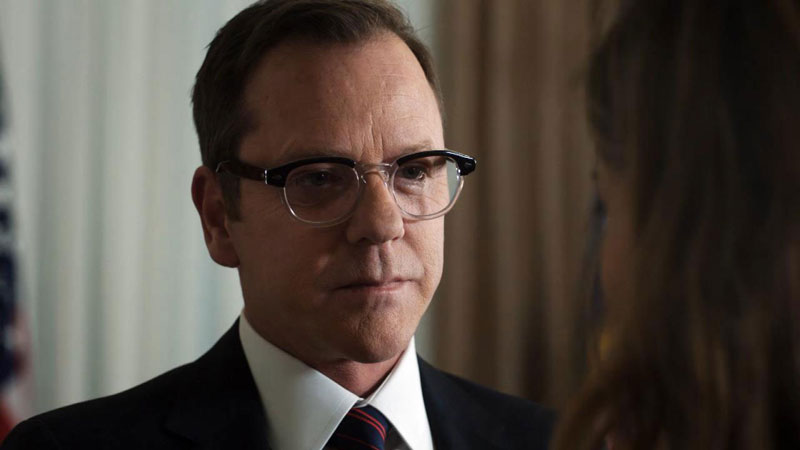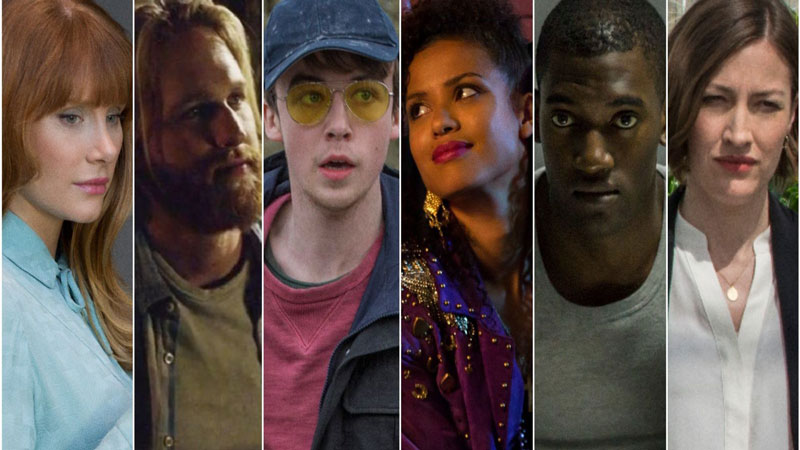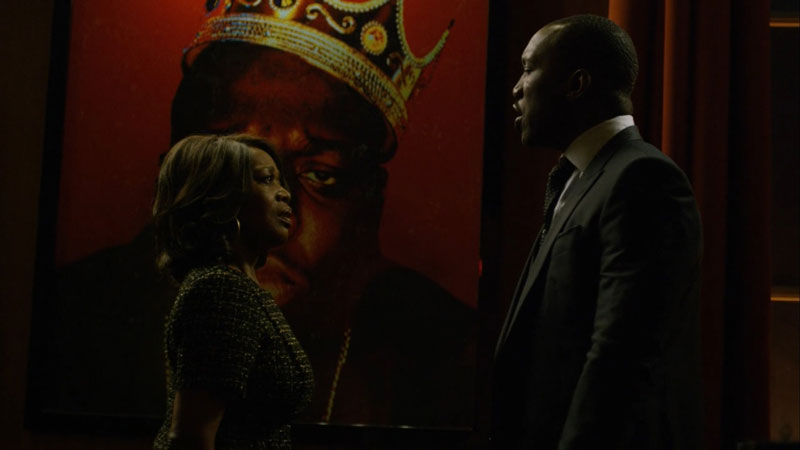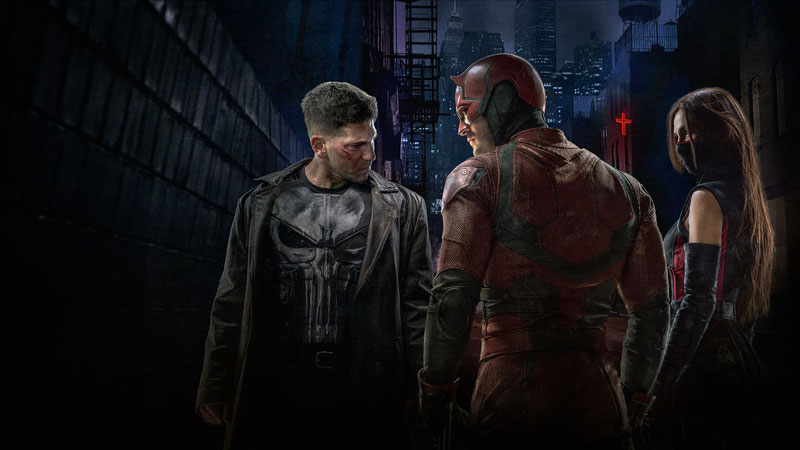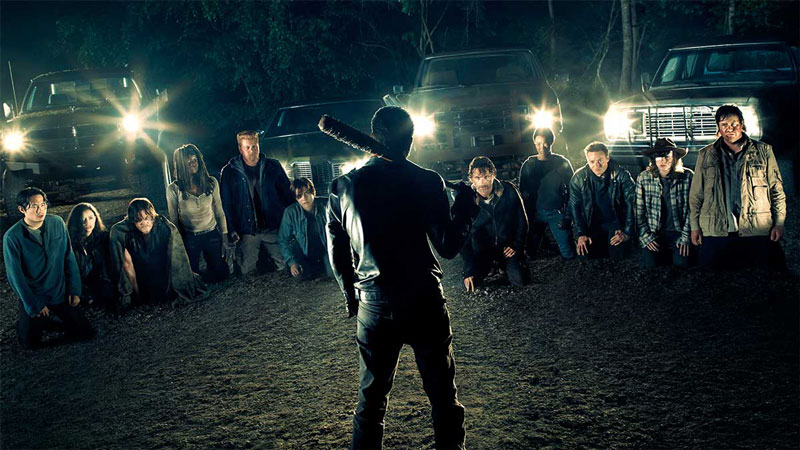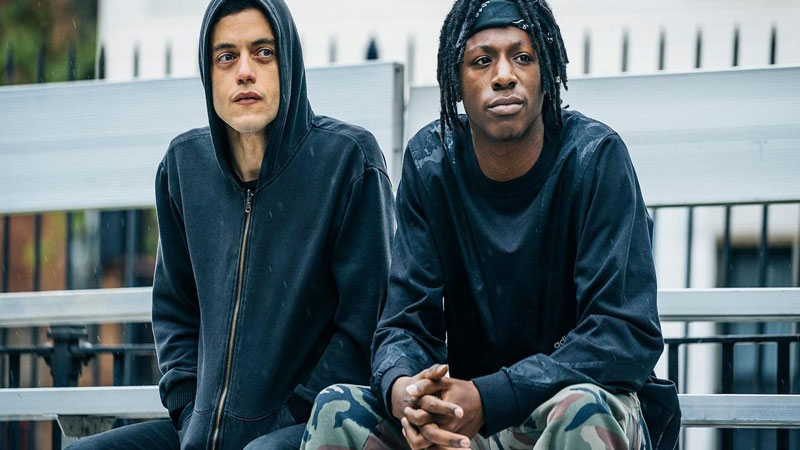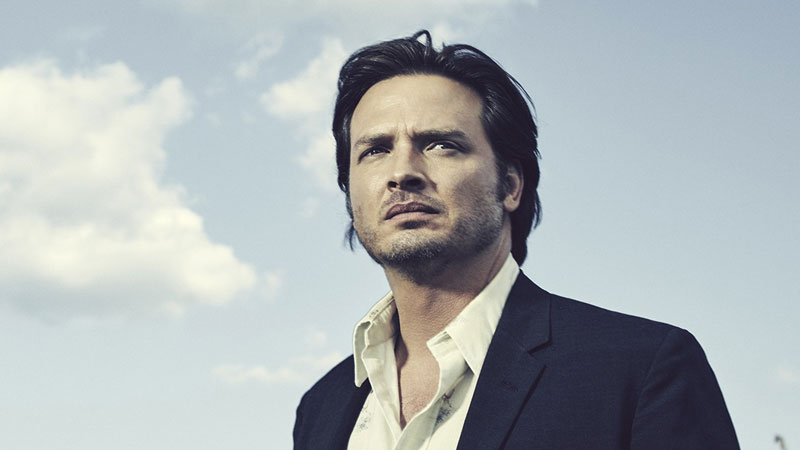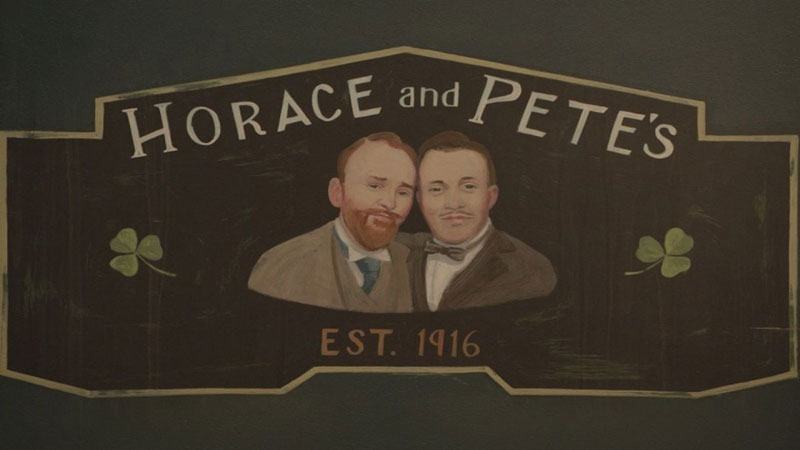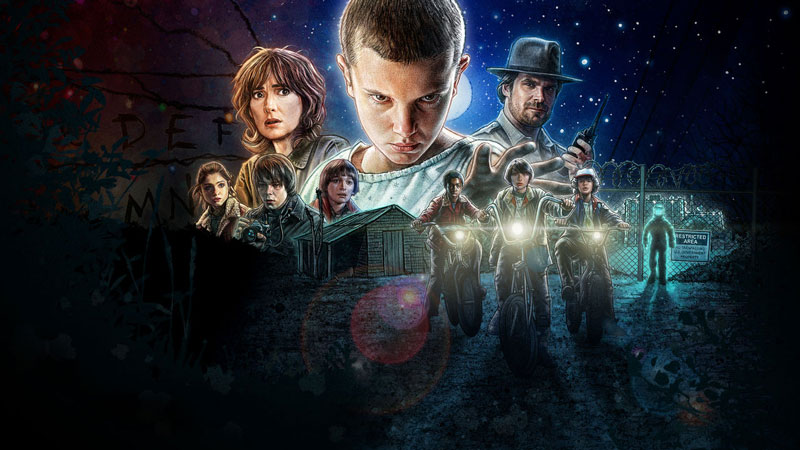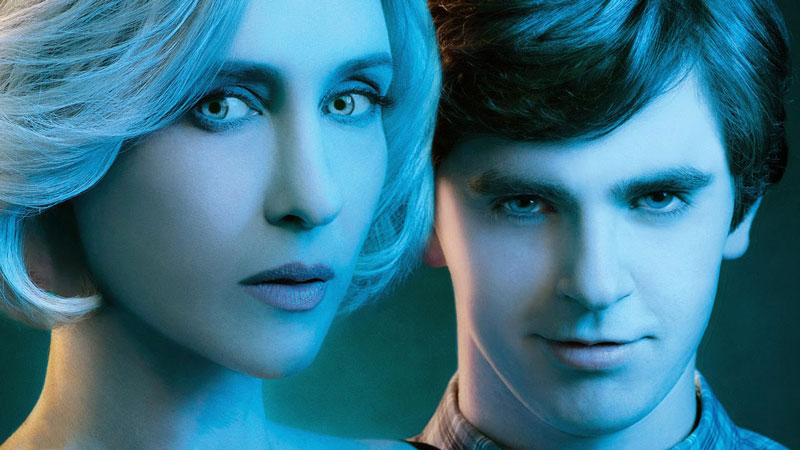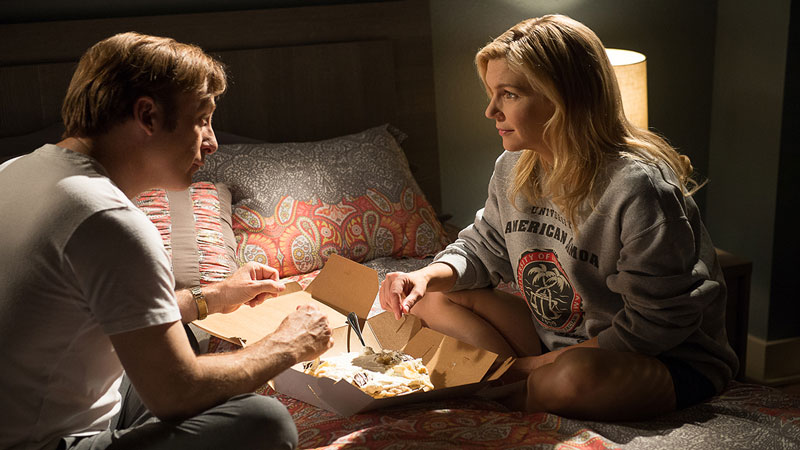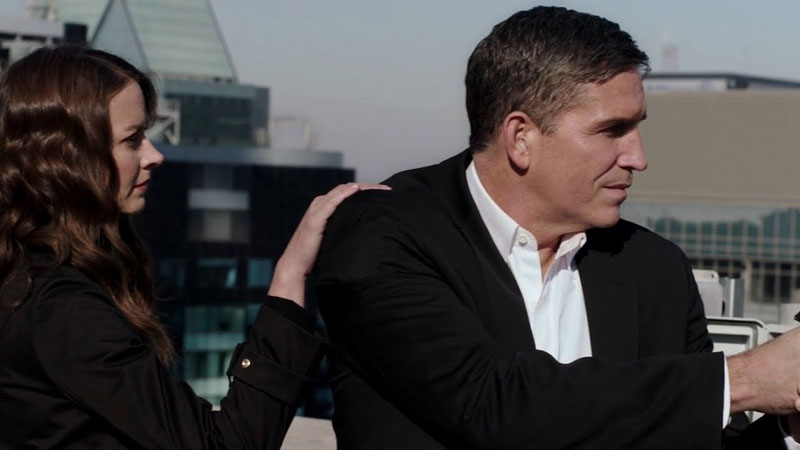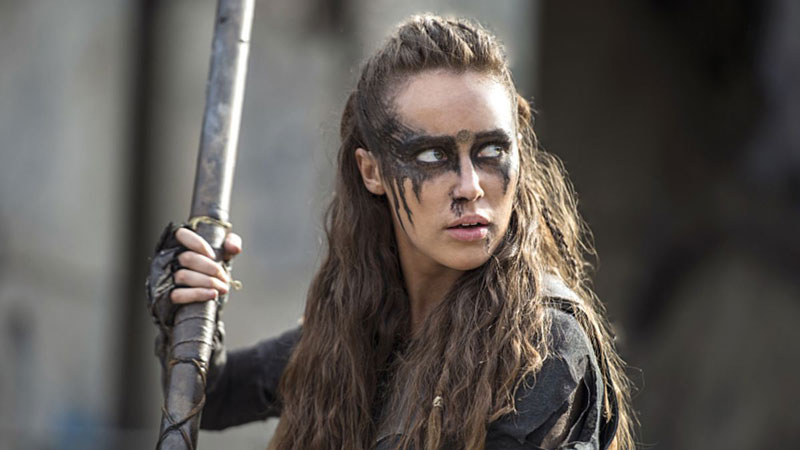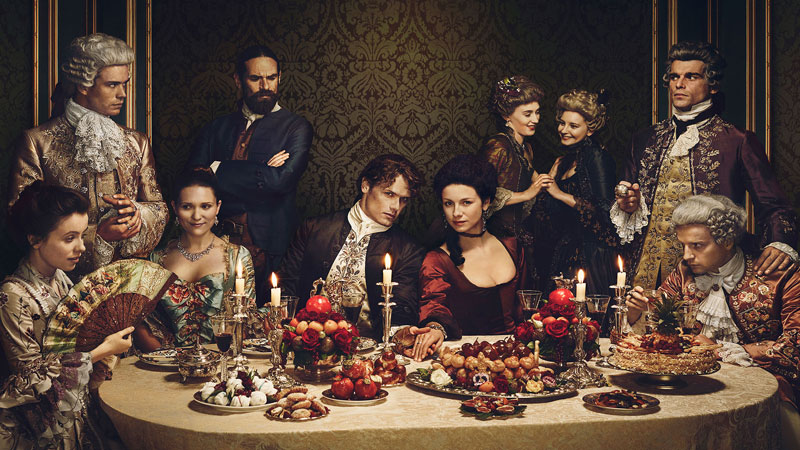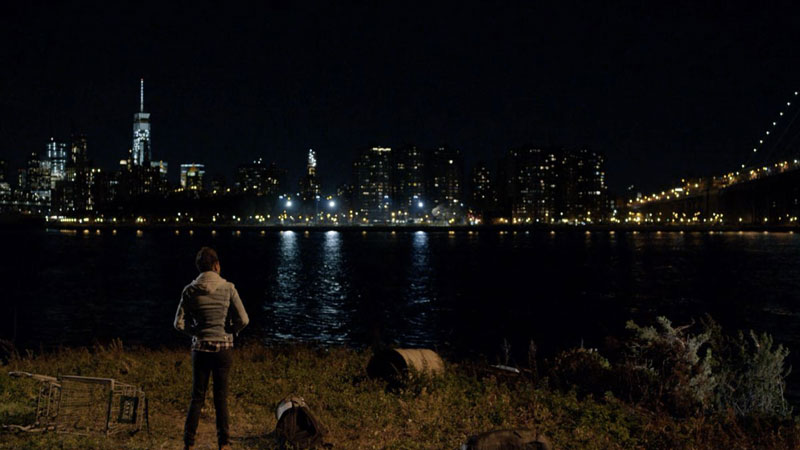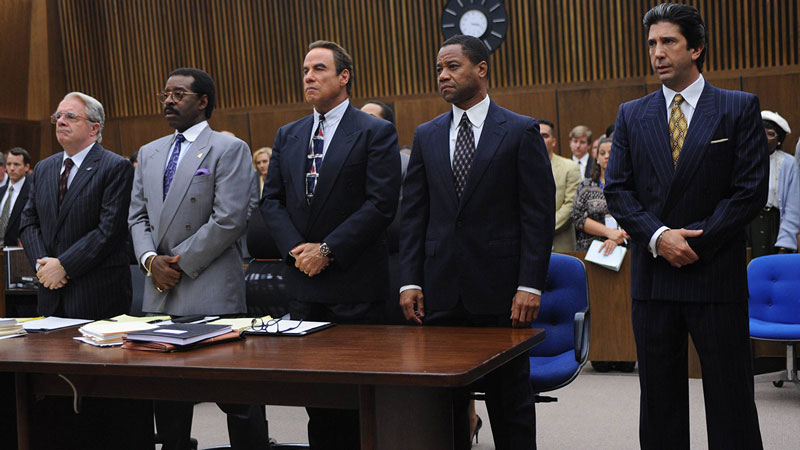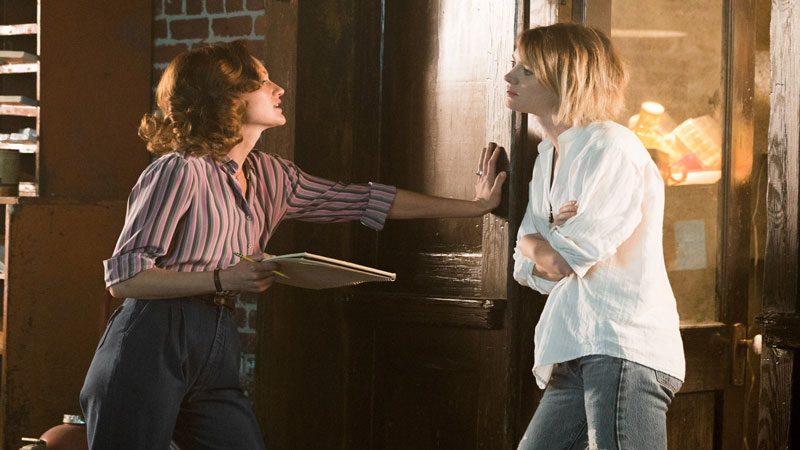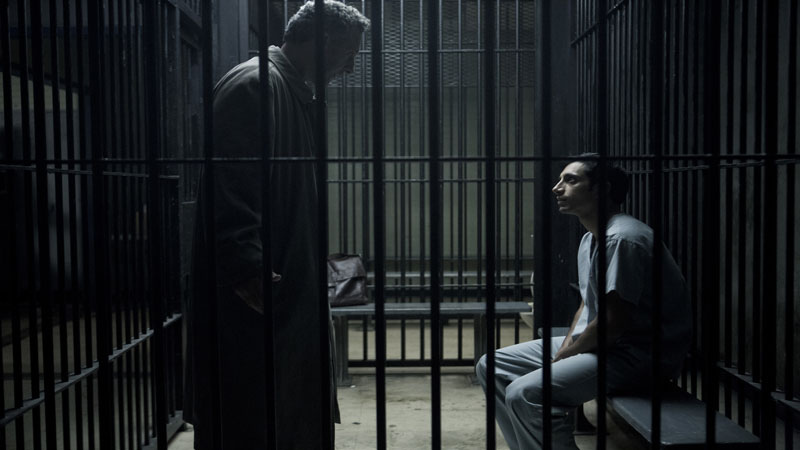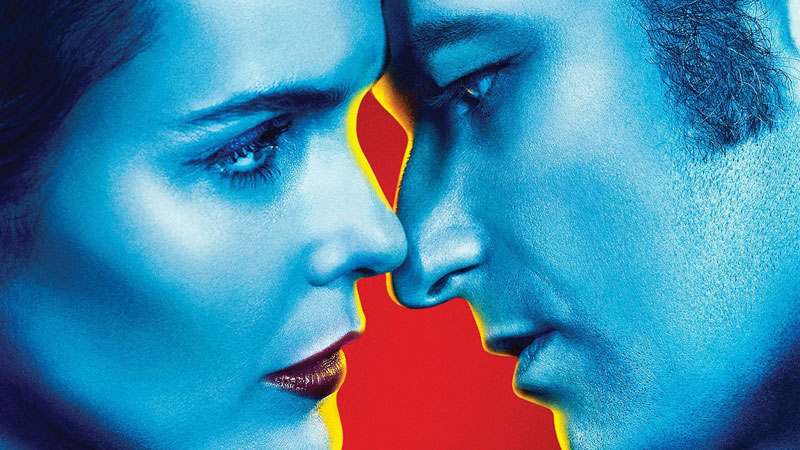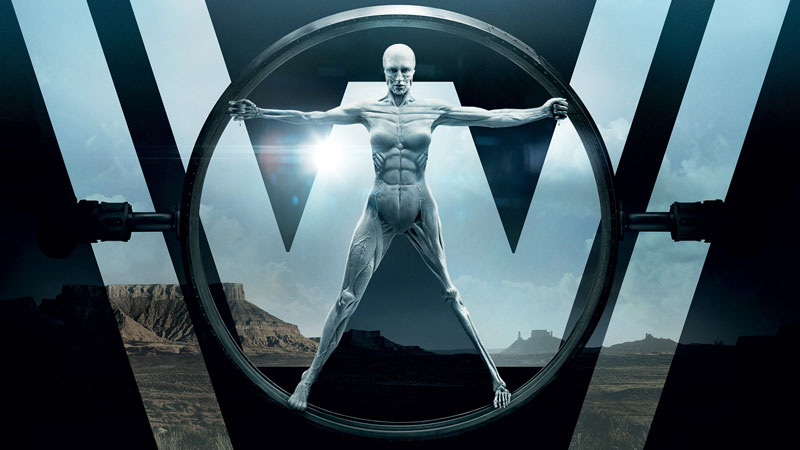The Path
Hulu
One of the more interesting new premiere seasons from this year, The Path (formerly known as The Way), had a lot riding on it. It was pushed as Hulu's first big scripted show, created by Jason Katims (showrunner on Friday Night Lights and Parenthood) and featuring Aaron Paul (Breaking Bad), Hugh Dancy (Hannibal) and Michelle Monaghan (True Detective) in the lead roles. Did it succeed? Well...
This show is different. It presents the viewer with a cult called The Movement that follows a lifestyle centered around The Ladder. The closest point of entry the audience has is Eddie (Aaron Paul), who seems to be the only person within The Movement that understands how strange it all is and has serious doubts regarding its newly appointed leader Cal (Hugh Dancy).
While there are some supporting characters that are investigating the movement from the outside, most of the series take place within the cult itself. As a result the viewer can tend to feel excluded, surrounded by true believers. Episodes such as The Shore feel like a breath of fresh air because so many episodes take place within the cult environment. Another shortcoming was the use of confusing repetitive visions throughout the show that made it difficult to interpret.
That being said, as the season progressed The Path began to find its footing. Unfortunately it ended right as things started to get interesting. Hopefully season two lands on more solid ground.
Orphan Black
BBC America
This year had a promising start, with the twist of reintroducing the long forgotten Beth clone, but it dropped that intriguing plot point fairly early in the season in favor of more convoluted storylines for a show long past its prime.
Tatiana Maslany is still doing wonderful work here in all of her various roles and I'm thrilled that she finally won an Emmy for her work, but the writing just isn't as good as it used to be.
American Horror Story
FX
This was the first season that American Horror Story's theme was kept a secret. Usually the FX marketing team announces the theme for each year fairly early on, but this time they decided to switch it up and released a slew of misleading teasers, with only one of them turning out to be correct. That being said, the showrunners placed other teasers' themes in the premiere erratically to keep the audience guessing.
By the end of the premiere the theme became clear, this season showed some promise with multiple interesting changes in format. Unfortunately, although the sum total is a definite improvement over most of the Lady Gaga filled mess that was Hotel, it just can't match up to the quality of seasons like Asylum.
There was strong acting here from Kathy Bates and especially from Adina Porter, but the past few seasons haven't been dramatically interesting or scary; instead going for cheap shocks above all else.
Broad City
Comedy Central
Broad City stars two of the strangest, charming and relatable women in the current television landscape, and continues to stroll along despite dipping in the ratings this year. Abbi Jacobson continues to portray one of the most awkward people on television while Ilana Glazer's expressions and reactions are still some of the funniest to hit the small screen.
While some of these episodes aren't as strong as previous years', the writing is still on point and any episode featuring Hannibal Buress is always guaranteed to have a good line.
It's Always Sunny in Philadelphia
FXX
Sunny is starting to show its age. Going into its 11th season, this cast just isn't putting out quite as many great episodes per year as they used to. While there are some clear highlights, such as Mac & Dennis Move to the Suburbs and Being Frank (primarily for its inventiveness), most of the rest of this season was filled with jokes that didn't hit as well as they should have. This was capped off with a two-part finale that fell flat.
Hopefully the Gang gets back on the wagon next time.
Fear the Walking Dead
AMC
Disclaimer: I have only seen up through Season 2, Episode 12: Pillar of Salt.
Man Fear the Walking Dead has turned into a real mess. Due to this show being a prequel to The Walking Dead there was a lot of potential for the series to catapult into something interesting. Especially once the characters embarked on a journey in a ship called the Abigail - the open ocean!
Instead, after one waterlogged zombie encounter, a squandered pirate storyline and a retread on what may have well been Herschel's Farm, the show sacrificed one of it's most interesting characters and sent everyone to Mexico. Okay, so maybe this is how the show would differentiate itself, opting for an ethnic flavor with some new locales. Look, a hotel!
Alright, so not everything has been terrible. Chris and Travis' ongoing rodeo has been fairly interesting and Grotesque is one of the better solo outings this show has attempted so far. But so much of the rest of this show has been done before and done far better. Give Kim Dickens something more interesting to do than just worry about her children. Give us a reason to Fear the Walking Dead.
And for God's sake if you're going to rip Alycia Debnam-Carey out of The 100 for this, give her some better material.
Designated Survivor
ABC
Disclaimer: I have only seen up through Season 1, Episode 4: The Enemy.
Jack Bauer's on television again!
Wait, that's not Jack Bauer, that's the president? So you're telling me he's not going to be in 24: Legacy?
Black Mirror
Netflix
Black Mirror is a British Twilight-Zone style anthology series focusing on the dangers of a world with an increasing reliance upon technology. Each season has usually been three episodes long, except for the Christmas Special (featuring Mad Men's Jon Hamm). So when it was announced that Netflix would be producing 12 new episodes, people were understandably nervous (though later it came to light this would be split over two seasons). Black Mirror episodes are always best experienced blind, so while I'll give some impressions about the themes explored in each episode, I won't go into any details about the new technology involved.
The first new episode, Nosedive (featuring Jurassic World's Bryce Dallas Howard), is a great episode to dive back into the horrifying implications of the future of social media. Howard gives one of her best performances here and her journey throughout is sad and a transformation to behold. This episode also features a beautiful score by the great Max Richter.
Playtest is an episode that starts off seemingly normal, but then dives into a strange ride through the possibilities of Augmented Reality. While it takes a bit to get going, once this episode gets into gear it's a trip.
Shut Up and Dance (featuring Game of Thrones' Jerome Flynn) is a dark episode that has a lot of potential that it doesn't quite live up to, but is still a tense ride along the way. It's also one of the only episodes of Black Mirror that is entirely possible today.
The fourth, and best episode this season by far, is San Junipero (featuring the wonderful talent of Mackenzie Davis from Halt And Catch Fire). This episode breaks the mold from most episodes that result in darker endings with a surprisingly hopeful resolution.
Men Against Fire (featuring Orange is the New Black's Madeline Brewer) is an episode of war that has some really good ideas, but the execution is lacking.
Unfortunately the final episode Hated in the Nation is both the longest and the dullest. I expect better from Black Mirror.
Overall, this is a season felt like it would have been better serviced with a more traditional episode count, given that Nosedive and San Junipero are the only episodes that feel up to the very high standards that previous episodes set. Hopefully the next round of episodes Netflix produces have a higher ratio that match previous seasons.
20. Luke Cage
Netflix
Sweeeet Christmas!
As the Netflix Marvel slate continues to grow, the next Defender enters the ring and delivers a knockout. Mike Colter may have already been introduced in last year's stellar Jessica Jones, but that was only through Jessica's point of view. In Luke Cage we really learn about his way of life, and more specifically, Harlem.
Hell's Kitchen may have been the setting for Daredevil and Jessica Jones, but really it was mainly just a reference point. Harlem feels like an actual character in this show, from the way that people talk about it, down to the culture that gives it life. Colter is serviceable enough for the lead role, but the soul of Harlem really lies in the supporting cast.
Specifically, I'm talking about Mahershala Ali and Alfre Woodard. Ali has a magnetic presence throughout most of the first season, as the owner of Harlem's Paradise, a front for the local mob. Meanwhile, Woodard's political presence is a huge part of what makes the city of Harlem sing, and her role only gets more interesting as the season progresses.
Executive Producer Cheo Hodari Coker uses music in an interesting way throughout the season, punctuating action beats and utilizing the club's locale to showcase the singers just as much as our hero. It's an interesting mix of standard comic book fare with the flare of this side of New York.
Unfortunately, the second half of the season doesn't deliver the punches quite as well. Once Ali's Cottonmouth plays his role during the season, a new villain is introduced to enter the ring. Woodard's Mariah continues to build her character throughout the season in interesting ways, but is sidelined for a more traditional confrontation that is disappointing mainly because the actor playing the new villain just isn't that engaging. However, the ending of the season sets up an intriguing future storyline that I just wish had played out this year instead.
Overall, what you have here is a flawed first season that has a lot of good ideas in place, but spent a little too long getting there. Simone Missick and Theo Rossi round out the cast nicely, with both having the potential to step forward in the coming seasons.
Standout episodes this year include Step in the Arena and Manifest.
Always Forward, Forward Always
19. Daredevil
Netflix
Season one of Daredevil did a good job of setting the groundwork for future seasons, really giving it room to expand. Having already initiated The Defenders (comprised of Daredevil, Jessica Jones, Luke Cage and Iron Fist), season two could have rested on its laurels and brought back Kingpin for another round.
However, Doug Petrie and Marco Ramirez had other plans. Instead of going the easy route, they introduced not only one, but two new players for Matthew Murdock (Charlie Cox) to tussle with in the ring: The Punisher (played by The Walking Dead's Jon Bernthal and Elektra (played by Elodie Yung).
The first arc of the season focuses solely on Punisher, and a lot of that was great. The roots of much of this performance can be seen in Shane's turn towards the dark side during The Walking Dead, and it's clear that Bernthal is in his element when he plays this type of character. This arc builds to a great climax between Cox and Bernthal that moves the story into the next stage.
The second arc doesn't play out quite as well with the introduction of Elektra. We learn that there's a long history between Elektra and Daredevil, which also includes Scott Glenn as Stick. Unfortunately, their relationship just isn't nearly as engaging as the Punisher material that preceded it and the parallel storyline with Punisher and returning co-star Deborah Ann Woll as Karen Page outshown the rekindling between Elektra and Daredevil. Karen also gets a great scene partner, Geoffrey Cantor as Mitchell Ellison, further solidifying that the Elektra storyline doesn't have as much to offer.
Luckily though, the Punisher storyline gets a kickstart around the final third of the season and helps make up for a lot of Elektra's shortcomings. While the ending of the season's focus isn't exactly where I wish it was, it teases a more interesting storyline that might play out either in Season 3 or The Defenders.
Standout episodes this year include Penny and Dime and Seven Minutes in Heaven.
18. The Walking Dead
AMC
Man this show has just been a TRIP.
So starting with delaying the moment that all comic readers were waiting for in the mid-season finale (and essentially making the mid-season premiere just mid-season finale: part 2), The Walking Dead began a disturbing trend of delaying audience gratification and taking what could have been potentially great adaptations of key moments from the comic and slicing them off at the knee. It also ended with this ridiculous montage.

This trend continued in the penultimate episode of season six, where the episode ended with the ridiculous notion that one of the core characters was going to be killed by an off-screen gunshot and one of the worst special effects I've ever seen in a television show. This was insulting to fans and just a cheap shot to catch people offguard.
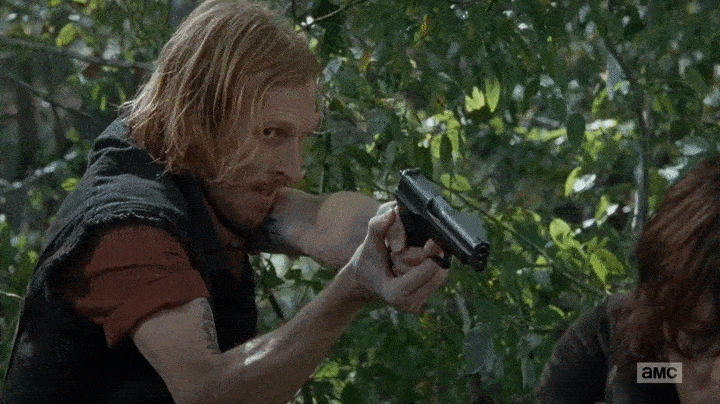
However, the absolute worst offender of this was in April's season finale, which continually teased the new villain Negan (played by Jeffrey Dean Morgan) and that he was going to make a huge impact in that episode. Instead, what happened was this moment was saved until the very end of the episode, and then they refused to deliver; deciding instead to turn one of the most impactful moments in the comic into a guessing game that completely cheapened the impact this moment may have had (it also doesn't help that they beat this horse in the first half of the season back in 2015).

It doesn't end there folks! Even in the September season premiere, this moment was delayed further, and then preempted with another letdown, adding an unnecessary addition to the moment that could have been covered earlier in the season. Therefore, when the moment finally arrived, even though it was extremely faithful to the moment in the comic, it wasn't nearly as effective as it could have played out in the season finale.
Beyond that whole mess, there are some aspects of the show that are still working. Melissa McBride is still doing amazing work as Carol, and although her character hits a snag near the end of season six, I think that ship will be righted before all is said and done. There's also an extremely dark episode in the latter half of season six that poses a great moral question to our heroes.
However, once season seven started, things were still shaky. There was a great introduction to The Kingdom early on, but most of the other episodes decided to focus on a single location and didn't work nearly as well. AMC has also been a bit too lenient on the showrunners this time, giving them a lot of extended air time during episodes that really didn't need it.
Speaking of extended air time, a lot of focus has been placed on Negan during this first half of the season, and while Morgan is doing good work here at times, cable television censorship is hurting the character's image and while it's clearly tempting to use Negan as much as possible, a more restrained approach would help make his presence more effective.
Hopefully the backlash that resulted over the missteps the creative team made this season will impact their decisions moving forward.
Standout episodes this year include Not Tomorrow Yet, The Same Boat and The Well.
17. House of Cards
Netflix
The show that first put Netflix on the map with the groundbreaking strategy of releasing the entire season at once is back for a fourth round, and better than ever. While the first season made huge waves as being a back-stabbing political drama with many twists and turns throughout, the show has slowly shied away from that as it progressed. However, for the first time since early on in season two, House of Cards seems to have found that spark again. The problem is, after the great Peter Russo storyline, the show got bogged down in Chinese politics and an inadequate adversary. Then, after Frank Underwood (played by the always compelling Kevin Spacey) finally achieved the presidency, there wasn't much else for him to scheme about other than how to maintain his status.
In season four, the show seems to have finally figured out how to get past that setback. While there weren't any schemes as maliciously twisted as in season one, it was replaced with Frank's past coming back to haunt him in a big way. This was sorely needed after season three seemed to wipe the slate clean as much as it did. There are some sequences around the midway point of this season that are the most twisted this show has ever attempted.
Much of the first half of the season is focused on the new rivalry between Frank and Claire Underwood (played by Robin Wright) that was teased at the end of season three. While this is interesting at first, elements of this relationship have been explored in previous seasons so a direct confrontation can only offer so much at this point. The second half of the season introduces a new rival that has a very public image and it's a refreshing new enemy for the Underwoods to tangle with. This ends with a climax that makes a bold statement and promises another intriguing plotline for 2017.
The standout episode for this year is Chapter 43.
16. Mr. Robot
USA
When Mr. Robot first premiered last year, it was a breakout success and most people never would have expected to see it on a network like USA. A lot of shows are guilty of drastically oversimplifying or misrespresenting how a process like "hacking" actually works (not that I'm a hacking expert by any means, but I do have a Computer Science degree), and Mr. Robot is one of the few shows that actually tries to get it right. Beyond that, one of the most interesting aspects of the show came to the forefront in Season 2: Elliot (played by the hypnotic Rami Malek) has a second personality named Mr. Robot (represented by Christian Slater, his long-dead father nonetheless). The "big twist" of season one (which in reality was a bait and switch for the real twist, being the revelation of Elliot's sister) became the core conflict of the season, making it impossible to tell what was real and what wasn't (as a later episode in season two would prove).
This meant that much of Elliot's story this year was an internal conflict, instead of an external one. While last season had a clear goal and resolution with the 9/5 hack, this year Elliot almost never knew what was going on (most amusingly during the episode where showrunner Sam Esmail opened an episode with the most audacious sequence the show has ever attempted: a 17 minute sitcom inside Elliot's head). What this meant was that the supporting cast came to the forefront in regards to actual plot momentum, with Darlene (played by Carly Chaikin), Angela (played by Portia Doubleday) and Dominique (played by Grace Gummer) each having huge storylines with FSociety, EvilCorp and the FBI respectively. Given that one of the primary criticisms of season one was that Elliot was the only fleshed out character (and just about everything seemed to be in service of the 5/9 hack plotline, except for Angela and Tyrell), this is a definite improvement. All three of these actresses were given a great range to work with and converged with each other in interesting ways throughout the season.
One of the things that didn't change however, is the online theorizing machines, which resulted in the primary twist of the first half of the season being guessed fairly quickly (more on that phenomenon later in this list). While this didn't take away from my overall enjoyment of the show, I will be avoiding critical analysis of this show in the future.
The core mystery this year was where in the world is Tyrell Wellick (played by Martin Wallström) after his encounter with Elliot at the end of last season? Tyrell was one of the most interesting characters last year, and his disappearance, while at first intriguing, takes far too long to get resolved. While his wife Joanna (played by Stephanie Corneliussen) beceomes more interesting the more we learn about her, she's only peripherally involved to the story this time around and there's no one else that shows up to fill that gap (though Craig Robinson and Joey Bada$$ are great additions to the cast).
Rounding things out is the partnership between the CEO of EvilCorp Phillip Price (played by Michael Cristofer) and the shadowy cross-dressing leader of the Dark Army Whiterose (played by BD Wong). Though their scenes are less interesting plot-wise (mostly focusing on the mystery of the Washington Township Plant), both of these actors have particular styles that make them more interesting to watch as people, and thus, make their scenes a treat to look forward to.
Overall, this season expanded the mythology of this universe in interesting ways, I just wish Elliot's internal conflict and Tyrell's disappearance hadn't taken so much of the season.
Standout episodes this year include eps2.4m4ster-s1ave.aes and eps2.8h1dden-pr0cess.axx.
15. Rectify
Sundance
Daniel Holden (played admirably by Aden Young) has been through a lot.
After having been imprisoned for 20 years and finally let out on a technicality, Daniel has done everything he can just to readjust to every day society, though his development was clearly stunted while in captivity. He's branched out just enough to move away from home, and yet he can never escape the experience of what happened to him in the unsupervised walls of justice.
However, Daniel's not the only one still in prison. His sister Amantha (played by Abigail Spencer) has been stuck in a waking nightmare ever since her brother was first convicted, doing everything she can to help get him out. She's spent so long trying to get him out, but now that he is she doesn't know what to do with herself. His mother Janet (played by J. Smith-Cameron), having lost her son before he truly grew up can't bring herself to stop trying to take care of him. Teddy (played by Clayne Crawford) and Tawney (played by Adelaide Clemens) are just trying to find a way to rectify a broken marriage that neither of them want to fully accept is hopeless.
Everyone in Daniel's family has been irrevocably affected by the choices that Roland Foulkes (played by Michael O'Neill) and the rest of the local justice department made on that fateful day in Paulie. The great mystery on Rectify has always been what really happened that night in the woods, with all signs pointing to Trey (played like a sly southern snake by Sean Bridgers), who has given absolutely no reason throughout the course of the series that his word can be trusted. The case has continued to develop over the course of the series, but showrunner Ray McKinnon isn't interested in the whodunit.
Rectify has always been about Daniel's rehabilitation into society, brought to a focal point this year with him joining the New Canaan Project, and even therapy. While this show would dance with the devil in the lion's den at times (such as in season two's Weird as You), it was never the point. In reality, this show has always been more interested in painting a canvas of how Daniel views the world, and the impact that a man trapped in solitary confinement for the majority of his life can have on those who have accepted false truths and closed their minds off from the possibility that they might be wrong.
After all, can you ever truly know another person?
Standout episodes for this year include Pineapples in Paris and Happy Unburdening.
14. Horace and Pete
LouisCK.net
Once upon a time, there was a comedian named Louis CK.
Louis began his career as a standup comedian and made a name for himself. Then one day, he worked with FX to make a show called Louie. This show incorporated elements of his real-life experiences to create a show that was unapologetic, unique and pushed boundaries. After five years of that, Louie went away for a while and all was quiet. Then one day, an e-mail popped into our inboxes with the title of a new show: Horace and Pete.
The first of it's kind, this show was released on LouisCK.net with an unorthodox pricing structure, no promotion whatsoever and filmed over the same ten week period that it was released in (which just sounds insane). This was an attempt by Louis CK to do something different and well, he certainly got my attention. Since he produced the show entirely by himself, there was no network sensors to accommodate for and no target audience to appease. Instead, he got to continue producing the content he wanted (though FX certainly gave him a lot of leeway on Louie) and it shows here.
Horace and Pete is a show about two brothers running a family bar that has existed for 100 years, carried on over generations always by a man named Horace, and another named Pete. In the current generation Horace is played by Louis CK, while Pete is played by the great Steve Buscemi. The previous Pete, who still works at the bar, is played by Alan Alda; then there's also Horace and Pete's sister Sylvia, who's played by The Sopranos' Edie Falco. Finally, while there were numerous other memorable characters throughout the supporting cast, the one that stood out to me the most was Marsha, played by American Horror Story's Jessica Lange.
This a show with a lot of philosophical debate and the milage may vary depending on your interest in the topic being explored in each episode. The topics explored throughout the series include abortion, infidelity, politics, religion and the transgender community. I don't want to discuss the plot anymore than I already have because going in blind is the way Louis CK would have intended it.
Check it out. It's on Hulu now as well.
Standout episodes for this year include Episode 1, Episode 3 and Episode 7.
13. Stranger Things
Netflix
When Stranger Things was released, it became an internet phenomenon. It seemed like everywhere you looked on social media, people never stopped talking about it. However, when I decided to check it out I wasn't blown away like I thought I would be. It didn't have a huge hook, but as I watched more episodes I noticed it did have two other things.
Like Super 8 before it, Stranger Things hearkens back to 1980's Sci-Fi, such as The Goonies, Star Wars and Alien. It centers around a group of kids with bikes that encounter something strange and try to do their best to help it without getting caught by the government, which is basically the plot of E.T. This nostalgia is partially what has led the show to garner a huge following, with basically no marketing push from Netflix. The other reason is the kids that are riding those bikes.
Child actors can complicate television immensely. In Lost, Malcolm David Kelley grew far faster than anyone anticipated and his storyline had to be drastically reworked. In The Walking Dead, Chandler Riggs was frequently ridiculed for his acting in the show's early years (though at this point he has become a far more accomplished actor). So when a television show gives children a lot of material, it's highly risky. Luckily though, the casting crew got it just right with Finn Wolfhard, Gaten Matarazzo, Caleb McLaughlin and most of all with Millie Bobby Brown (as Eleven). All of these actors were able to competently pull off the material given to them. They played off each other extremely well and the show would never have worked without them.
Meanwhile, Winona Ryder, as Joyce, shrieks her way through the season after her tragedy unfolds, seemingly getting crazier and crazier as the season plays out. Her foil Jim (played by David Harbour) is annoying at first, but becomes more likeable as he figures out what's going on.
To mention any more would ruin the mystery behind the proceedings, so just know that this one is definitely worth checking out.
There weren't any particular standout episodes for this show, because the whole season felt like one complete story to me. Therefore, I am declaring the entire season as a standout (minus Barbara).
12. Bates Motel
A&E
Yet another horror movie prequel a la Hannibal and The Exorcist, Bates Motel uses its relationship with Alfred Hitchcock's Psycho to create a never ending feeling of tension with Norman Bates (played by Freddie Highmore). Having always been overshadowed by the great Vera Farmiga (who plays his mother, Norma Bates), Highmore finally comes into his own here. This show began as a slow burn, depicting Norman with as much innocence as possible for someone that would eventually develop into a psychopathic killer. However, as the seasons progressed the moments of Norman slipping into his other persona began to happen with more and more frequency. Although the insanity was dissipated by sending Norman off to a psychiatric facility, this allowed for the kind of interesting and introspective material that was normally reserved for the concluding episodes of previous seasons.
Norma completely lost any semblance of control she previously had over Norman. His other personality is now more present than ever, further destroying any innocence that Norman has left. All of this finally begins to get explored with his psychiatrist Dr. Edwards (played by Damon Gupton), who over the course of the season learns the extent of the damage to Norman's psyche. These are some of Highmore's biggest showcases he's ever had in the series, among other scenes with Norma.
Meanwhile, Norma's storyline is primarily focused on her romance with Sheriff Romero (played by Lost's Nestor Carbonell) and it feels like she can finally find happiness that isn't predicated on her relationship with her son. Carbonell has always felt partially like an antagonist to the Bates family simply because of his status as a police officer and the knowledge of what Norman will eventually become. Though, ever since Norman has become more unstable, this has led to Romero becoming more likeable and justified in his suspicions. This ties directly into the endgame of the season, which I won't talk about here. However, I will say that this is the best ending run of episodes of Bates Motel so far.
There are still some rough edges here and there: such as the continued presence of Chick (played by Ryan Hurst), a quirky oddity that while entertaining at times is a strange leftover character from last season's storyline. Since then Chick has turned into a plot device to create external conflicts for Norma. Meanwhile, as charming as the relationship between Dylan (played by Max Thieriot) and Emma (played by Olivia Cooke) is, it can't help but begin to feel increasingly irrelevant to the plot (except maybe as future cannon fodder) especially now that they've moved out of the area.
This has been the best season of Bates Motel since season one and if this conclusion is anything to go by, the final season is going to be very interesting.
The standout episode for this year was Forever.
11. Better Call Saul
AMC
When Breaking Bad was ending, discussions of a spinoff began. It seems that whenever successful shows approach an end, networks want to secure that fanbase with another show. So when Better Call Saul was announced I was certainly hesitant, but with Vince Gilligan at the steering wheel I should have known better. Having moved out of the shadow of its predecessor, Jimmy McGill (a.k.a. not-quite-Saul-Goodman, played by Bob Odenkirk) continues to differentiate himself from his brother.
While the pilot used the hook of pulling Tuco (played by Raymond Cruz) from the Breaking Bad rolodex, much of Better Call Saul has built a strength of its own without having to rely on characters who've been grandfathered into Jimmy's life. That being said, the ability to access such characters as Tuco and Hector Salamanca (the latter of which is played by Scarface's Mark Margolis) and especially Mike (played by Jonathan Banks) has given the series a richness that wouldn't be possible without the future connections that enhance these characters. Does it take away some of the tension? Yes, because of course we are aware that Jimmy, Mike and the rest of the alumni will make it into the events of Breaking Bad. However, this is a case where the journey is more important than the destination. We know that Jimmy will eventually become Saul, and that Mike will work for Gus Fring (Breaking Bad's amazing Giancarlo Esposito), which gives this story a unique opportunity to flesh out these characters and continue to build the mythology of this rich Albuquerque world.
However it's not all about the old cast, the show has also been building great new characters such as Kim Wexler (played by Rhea Seehorn) and Chuck McGill (played by Michael McKean). Kim is a partner for Jimmy both in work and love; she really carves a space for herself in this world during season two. She continuously chooses to work independently from Jimmy in order to avoid being dragged down with him with his increasingly unsavory tactics. Then when it comes to Chuck, well this is a really unique role. McKean has to constantly portray a man who may or may not have a unique disease with a relation to electromagnetism. What this means is that every time he approaches any form of electricity he gets weak in the knees; this adds an interesting complication for a perfectionist.
On Mike's side of the fence, in addition to encountering pretty much everyone from the former cast, he also has a working relationship with a dealer named Nacho (played by Orphan Black's Michael Mando). Just as in Breaking Bad, Mike is primarily doing this kind of work for his granddaughter Kaylee (played this time around by Abigail Zoe Lewis), as well as her mother (and Mike's widowed daughter-in-law) Stacey (played by Kerry Condon). This has always been what has made Mike such a relateable character (best seen in last year's Five-O), and his material continues to be outstanding this season (much of the time outshining the title character, in fact).
Ultimately this show has continued to defy initial expectations for what could have very easily been a disaster, and I look forward to continuing the downward journey as Jimmy McGill becomes Saul Goodman.
Standout episodes for this year include Rebecca, Nailed and Klick.
10. Person of Interest
CBS
"If you can hear this, you’re alone. The only thing left of me is the sound of my voice. I don’t know if any of us made it. So let me tell you who we were. And how we fought back."
For a lot of shows, the final episode can shape the entirety of the way it's perceived for years to come. The Sopranos, Lost and Dexter were all examples of shows with controversial (and some outright bad) endings that forever changed the way those shows were perceived. All because of one final moment. One final episode that revealed what the show was really about. This is because the moment that often matters the most to people is the last one.
Person of Interest was often a show about preventing final moments. A science fiction analysis of artificial intelligence disguised as a weekly procedural on the network most guilty of harboring that repetitive type of show. The type of show that a viewer can drop in on any random episode and get a contained and complete story with no dependencies, such as NCIS, CSI and Law and Order. So when The Dark Knight's Jonathan Nolan decided what he wanted to do, he kept it a secret. Sure, some of the writing staff probably knew what his true ambition's were, but if he had initially pitched what the show eventually became, he would never have made it on a network like CBS.
A man named Harold Finch (played by Lost's Michael Emerson) built a machine that can tell when something bad is going to happen, and he works with another man named John (played by The Passion of the Christ's Jim Caviezel) to stop that final moment from occurring. The first season was full of episodes where it functioned just like you might expect a procedural to, a one and done premise that has no complicated storylines that might tempt a new potential viewer to change the channel. However, as the series continued it slowly began to transform, bringing in organizations and crime syndicates with memorable leaders: a clear influence from the man that used to write for Batman movies.
By the time the show reached its final season the recurring cast had grown considerably, particularly after the introductions of Sameem Shaw (played by Sarah Shahi) and Root (played by the always enjoyable Amy Acker). Both a part of seemingly close-ended storylines, these two actresses became series regulars after the nature of their roles became clear. In this series Nolan would often employ the concept taking a seemingly close-ended story and pulling the rug out from under the audience to show how it would factor into the core mythology. This was also true when it was time to introduce what eventually became the primary villain.
During a group of episodes in the middle of Person of Interest's run, one of Finch's old friends who was in trouble was revealed to have been working on a project that would have far-reaching implications for the future of the series. This project was a machine called Samaritan. Samaritan was a lot like the one our heroes would work with every day in order to help people, only malicious and ran by a man named Greer (played by Nolan's uncle John Nolan). This would eventually pivot the show's path into a war story between two machines, which continued into the final season.
Hobbled by delays and unclear vital signs, the final season felt like it would never come. Finally, in the summer months CBS aired a shorter season, which was planned to be the end of the series. Instead of a single overarching plot, the show continued to tell individual stories for most of the final season. While this led to some episodes feeling irrelevant, others were used to give justice to moments from earlier in the series that were never given their full due (such as in Sotto Voce). However, not everything would get tied up; scheduling conflicts would hinder the return of characters like Control (played by Camryn Manheim) and Zoe (played by Paige Turco). Luckily, at least one pivotal character wouldn't be left out.
After sitting out the second half of the last season due to her pregnancy, Shahi's Shaw finally returned in what was one of the greatest episodes of Person of Interest, and one of the best television episodes of the year. In the fourth episode of the season, Nolan and his secret weapon for achieving maximum tragedy, Denise Thé, wrote their magnum opus. This was a story with an ending so devastating that the rest of the season couldn't help but pale in comparison to the gravity of what they accomplished (with a few exceptions).
Overall, what really mattered was that final moment and the creative team behind the show delivered in spades. With a couple of inspired musical choices (including a haunting piece by Philip Glass) and a clear message, this was a perfect sendoff for a series that was always about subverting expectations. While some characters may have gotten short shrift (Kevin Chapman's Fusco in particular), this was never originally supposed to be the final season. Given what the team had to work with this turned out far better than it could have.
Finishing a story is no easy thing, as Damon Lindelof once said: "Endings are hard." When a series caps off with something special, though I may be sad that the series ended, I sit up and take notice. I didn't have the problems that most people did with Lost's ending and I still haven't finished The Sopranos, but Dexter's ending hurt. So much so, that it forever tarnished the memory of a series that was great for over half of its run. Dexter was a character that inspired my video editing pseudonym, and it crashed and burned into a lake that it never should've crawled back out of. So when a series that I love takes the proper time to finish it's story right, I take notice.
"Sure. Everyone dies alone. But if you mean something to someone, if you help someone, or love someone. If even a single person remembers you. Then maybe, you never really die at all."
Standout episodes for this year include 6,741; The Day the World Went Away and Return 0.
9. The 100
The CW
After Battlestar Galactica ended there wasn't a whole lot of good science fiction shows; many began to wonder if something else would rise to take it's place. After all, Caprica, the official spinoff ended up being cancelled after only one season. Then Syfy began to turn away from serialized television and started focusing more on their original movies (which are terrible), "reality" television trash like Ghost Hunters and Wrestling of all things.
Then one day, a little network called The CW put out a show called The 100. The concept? Humanity has been living in space for years because the Earth has become a nuclear wasteland, but now in order to survive they have to send 100 children to Earth before everyone perishes. The children survived and the Earth proves to be inhabitable after all, but they're not alone: there are natives (called Grounders) and they're hostile. It was okay at first, with some interesting ideas, but as it continued towards the end of season one and into its incredible second season, it began to make a larger impact. The world was expanded and the early trivialty transformed into true dramatic stakes.
There were many kids that crashed onto Earth, but the central focus is around Clarke Griffin (played by Eliza Taylor), who by this point in the story has left the others and gone off on her own after the dark conclusion of season two. Not long after she is unceremoniously reunited with her former friend Lexa (played by the incredible Alycia Debnam-Carey), the Commander of the Grounders. Their scenes together are one of the high points of the series, and it continues that trend in season three.
Clarke's not the only child we get to know though. The 100 boasts an impressive cast and two of the most important ones are the Blake children: Bellamy (played by Bob Morley) and Octavia (played by Marie Avgeropoulos). Bellamy has had an interesting journey up until now, having been a central figure in the war effort against the Grounders and molded over time from a petty antagonist into a strong protagonist. However, at the start of this season, he is given a rushed storyline with unclear character motivations for joining a man named Pike (played by Michael Beach). While some effort is taken to mend this as the season continues, it hurts while it lasts, and forever puts a stain on his character. Octavia continues on her transformation towards becoming more and more like a Grounder, with some added tragedy added in the mix. I was glad to see that her seemingly shattered relationship with Indra (played by Adina Porter) wasn't abandoned completely since this was one of the better pairings from season two.
When the 100 kids were sent to the ground, there were others that followed them once the air was declared safe to breathe. The three main ones that we follow are former Chancellor Thelonius Jaha (played by Isaiah Washington), Marcus Kane (played by Lost's unforgettable Henry Ian Cusick) and Dr. Abigail Griffin (played by Person of Interest's Paige Turco), who is Clarke's mother. Kane had his share of flipping sides and Abigail has mostly remained the same, but Jaha's character clearly changed the most since the series began. At first he was on a quest involving his son and then he was placed in captivity after a power struggle occurred between him and Kane. However, once Jaha put his anger away and began looking for the City of Light in season two he began to get interesting. His charismatic nature revealed itself and was clearly instrumental to him becoming a leader; this made him a joy to watch, especially once he was paired with John Murphy (played by Richard Harmon). Unfortunately once Jaha actually arrived in the City of Light, he gets wrapped up with a character called Alie (played by Eureka's Erica Cerra). This leads to him not being nearly as likeable as he had become previously, making me wish more of the season had played out without his alliance with Alie.
The final group of kids that played an important part in season two are Jasper (played by Devon Bostick), Monty (played by Christopher Larkin), and Raven (played by the delightfully vicious Lindsey Morgan). While Jasper dealt with his grief over the dark conclusion from season two and Monty found love, Raven definitely had the most interesting complications this year; just wait until you see Nevermore. Her continued mentorship with Sinclair (Battlestar Galactica's incomparable Alessandro Juliani) has always been a joy to watch.
Now I'd be remiss if I didn't mention the controversial exit of two actors from the season three cast (all of this has been highly publicized, but for the sake of spoilers I'm not mentioning their names here; I'll just say they were both killed). The manner in which both of these actors left the show resulted in a huge backlash (though for entirely different reasons), and showrunner Jason Rothenberg took a lot of heat this year because of it. While he has apologized for the circumstances involving one of the actors (and it's also partially completely out of his hands), the other one he has remained rather mum on and the only answer given was a standard network response. It's unfortunate that this happened, but it's hard to know who is really at fault without hearing both sides of the story.
As you can see from the length of this review, this show has a huge cast and while not everything worked as well as it should have, I do still think this is one of the better shows on television right now. I personally can't wait to see what happens next.
Standout episodes for this year include Watch The Thrones, Thirteen and Nevermore.
8. Outlander
Starz
After Ron Moore finished Battlestar Galactica (the greatest modern science fiction show of our time) I wasn't sure what he would do next, but if you had told me it would be a fantasy adaptation skewing to be the antithesis of Game of Thrones for women (with less violence, yet somehow more rape), I never would have guessed it.
Starring the magnificent Caitriona Balfe as Claire and Sam Heughan as Jamie, Outlander is a time travel romance with a dose of action here and there. Based on the long-running series of novels by Diana Gabaldon, this is an ambitious undertaking by Starz. The first season was successful in grabbing its target audience and ended with some of the darkest and disturbing episodes of television I've ever seen.
Season two premiered in a new country and with a baby on the way. The production design grew and the cast was simplified, giving Duncan Lacroix's Murtagh some time to shine and introducing the slimy Prince Charles Edward Stuart (played by Andrew Gower) who alternated between being an adversary and an ally. The new setting really expanded the world, adding flair unseen in the previous Scottish locale.
This season also features the return of the deplorable Captain Jack Randall (played impeccably by Game of Thrones' Tobias Menzies), one of the most terrifying and captivating villains I've ever seen. Largely responsible for almost every atrocity that occurs on Outlander, Jack Randall always grabs my attention whenever he returns to the storyline.
While the first half may be full of surprises, the second half returns us to familiar territory. It feels like meeting old friends seeing Dougal MacKenzie (played by the great Graham McTavish) and Angus (played by Stephen Walters) again. However, once the countdown to the Battle of Culloden begins, those feelings are washed away. While clearly not possessing a budget as large as some of its contemporaries, the show still made quite an impact with its war climax.
Beginning the season by showing the viewer the conclusion is an interesting decision; it completely changes the way the season is viewed, and adds an element of tragedy to the whole affair (pun intended). At times knowing the ending feels like an unwanted spoiler, but it also adds a welcome layer. By the end of the season it became clear the decision was effective in achieving the maximum emotional impact.
Standout episodes this year include La Dame Blanche, Untimely Resurrection and Dragonfly in Amber.
7. Orange is the New Black
Netflix
After a lackluster and low stakes third season, Orange is the New Black is BACK! With less random flashbacks and a stronger narrative, this season is the best one since the first and wow does it get dark. Just as the primary community focused on in season two was the African American women, this time the Hispanic population gets a spotlight. In addition to this, a change of the guard is in order and this will forever leave an impact on the inmates of Litchfield Penitentiary.
After the jailbreak out to the lake that occurred at the end of season three, the warden Caputo (played by Nick Sandow) is forced to fire most of the existing staff charged with keeping this prison under control and bring in a new set of faces. These guards (led by a man named Piscatella, played by Lost's Brad William Henke) carry a lot of issues with them and frequently take them out on the inmates in disturbing ways.
One of the most interesting changes this year is Piper (played by Taylor Schilling). The former leading member of the cast (before the show expanded its scope in season two), Piper has slowly become more unlikeable since she began her panty selling business, to the point where she actually ends up initiating a White Supremacist group. This leads to a dark confrontation between Piper, Ruiz (played by Jessica Pimentel) and her crew that will forever leave a mark on her.
Meanwhile, Pennsatucky (played by Taryn Manning) continues to become more likeable in an interesting morality reversal that showrunner Jenji Kohan has been toying with since season two. Pennsatucky already had an amazing showcase episode in last year's A Tittin' and a Hairin', but the fallout from that encounter sparked a controversy amidst the show's fanbase. What was first a revenge scheme changes when Pennsatucky's anger and hate fades away and is replaced with sadness. This sadness is rooted in her tragic past, that she thought she might be able to escape when she met Coates (played by James McMenamin). However, all he did was remind her of what came before and how horrible another person can be. So when Pennsatucky began to show sympathy for her attacker, it pushed a few people in the fanbase's buttons.
In an interesting new wrinkle for the series, the first celebrity to enter the prison is a woman inspired by Martha Stewart, Judy King (played by Fringe's Blair Brown). First teased near the end of last season, King is well known to the inmates at Litchfield, particuarly by Poussey (played by Samira Wiley). In addition to her fangirl reactions to King, Poussey also strikes up an sweet romance with Soso (played by Kimiko Glenn). This relationship has made Soso more likeable compared to the odd character she was when she was introduced back in season two.
Speaking of odd characters, Lolly (played by Lori Petty) continued to advance as one of the best characters in recent years. Seemingly introduced as a one-off confrontation for Piper back in the season two premiere, Lolly was later brought back into the fold after a population increase that negatively affected the core cast in various ways. She is given a great storyline with Alex (played by That 70s Show's Laura Prepon) and Red (played by the hilarious Kate Mulgrew) and an even better one with Mr. Healy (played by Michael Harney).
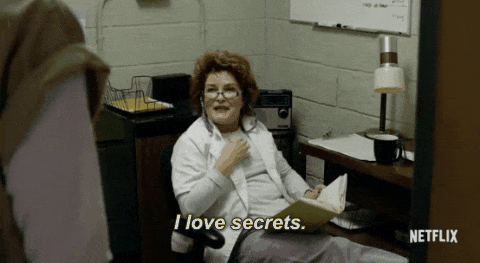
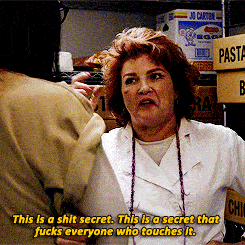
As you can see, Orange is the New Black still has a huge cast. Nicky (played by Natasha Lyonne) was thankfully brought back into the fold after being sidelined last year and is played by one of the best actresses in the entire cast. Morello (played by Yael Stone) and her never-ending fascinations with finding true love continue to entertain as well. However, it's probably best that I stop here, or else this entry might last as long as a sentence at Litchfield.
Standout episodes for this year include It Sounded Nicer in My Head, Turn Table Turn and Toast Can't Never Be Bread Again.
6. Game of Thrones
HBO
I'm not even going to mention anything that may or may not have happened with Kit Harington. Just putting that out there up front.
Last season's Game of Thrones began to show some cracks. Based on the long-running epic novel series, A Song of Ice and Fire by George R.R. Martin, this is the most ambitious television show ever made. The showrunners haven't always able to match up to the scale that the novels have put in place such as the truncated battles from the end of season one and the missing chain from season two's Blackwater. However, Game of Thrones has been successful enough for HBO that they have given showrunners David Benioff and D.B. Weiss the resources necessary to pull off incredible episodes on the level of last year's Hardhome and this year's Battle of the Bastards (both of which were directed by Miguel Sapochnik).
However, other than the aforementioned Hardhome, season five was a bit of a slog. It was shackled by a misguided attempt to stay within the confines of the most recent novel (A Dance with Dragons). While there were a few moments that surpassed that novel's scope, most of the ending of that season was cliffhanger after cliffhanger in order to give Martin enough time to finish writing The Winds of Winter (the sixth of seven currently planned novels). The worst part about this that Martin didn't even manage to get it done and there is no release date in sight.
So when it became clear to Benioff and Weiss that Martin wasn't going to be able to keep up, they had several choices: either delay the show, sidestep the storyline and adapt a spinoff based on A Knight of the Seven Kingdoms or surpass the novels altogether with whatever knowledge has been bestowed to them by Martin behind closed doors. Obviously they chose the latter option and it has resulted in a very unique case where an adaptation of a written work will now most definitely be completed before the original. This gave the show a huge burst of energy that was sorely lacking in season five and has resulted in a return to the kind of exciting storytelling that drew everyone to Martin's work in the first place.
Given how big of a secret everything was this season, it would be remiss of me to discuss plot details in this entry, so I'll simply leave it at this: the build-up and resulting conclusion of this season is one of the best the show has ever pulled off, with an expertly executed climax, directed by Sapochnik, and containing the best piece that composer Ramin Djawadi (also the composer of Person of Interest, by the way) has ever written.
Standout episodes this year include The Door, Battle of the Bastards and The Winds of Winter.
5. American Crime Story
FX
When Ryan Murphy announced that he was going to make American Crime Story (a title that oddly sounds like a spinoff to the vastly different American Horror Story) and that the first season was going to focus on the OJ Simpson trial, people weren't sure what to expect. Given his previous creations, which include Glee, American Horror Story and Scream Queens people expected this going to be an over-dramatization with no factual resemblance to the true case. What it actually turned out to be was a competent retelling of a major historical event in the United States Department of Justice.
Featuring an all-star cast, American Crime Story is in no short supply of talent that is capable of pulling off the Trial of the century. First up is the man of the hour himself: OJ Simpson (played by Cuba Gooding Jr.), who may not have the same physical appearance as OJ, but was definitely able to capture the infamous former football star's personality. Representing OJ's defense, there's the Dream Team, which includes Robert Shapiro (played by John Travolta) and Johnnie Cochran (played with electric thunder by Courtney B. Vance). On the other side of the court lies the prosecution team, led by Marcia Clark (played by Ryan Murphy's American Horror Story mainstay Sarah Paulson) and Christopher Darden (played by Sterling K. Brown). These two teams, along with the defendant, portray this trial from The Run of His Life in a Ford Bronco until the final verdict was laid out for the world to see.
From the highway chase to the glove that wouldn't fit, all the key moments from OJ's trial are recounted with dramatic finesse, but there also were other aspects included that in hindsight really help to understand what went down in 1994. The show really aimed to change previous public perception of Marcia Clark, who was treated so horribly over the course of the trial that you can't help but feel for her predicament. Futhermore, there's Robert Kardashian (played by Friend's David Schwimmer), who has been given a large role in the series that, while not entirely accurate, still holds interest due to this being the genesis event that would eventually lead to the rise of the Kardashian family into the public eye. And then there's Johnnie Cochran, a Civil Rights advocate played with great conviction and gravitas, whose position feels all the more relevant with the rise of the Black Lives Matter movement. The writers have clearly taken a stance on the trial, with OJ being portrayed as 100% guilty.
While the conclusion of the trial is public record, this story is all about the journey and absolutely worth it every step of the way.
Standout episodes for this year include From the Ashes of Tragedy; Marcia, Marcia, Marcia and Manna From Heaven.
4. Halt And Catch Fire
AMC
AMC hasn't always been the powerhouse network it is now. Before the massively successful The Walking Dead or the critical darling Breaking Bad, AMC was only home to classic films and little else. That all changed in 2007 when Mad Men premiered with Don Draper (played by Jon Hamm). Focusing on the 1960's advertising industry, Mad Men would go on to revolutionize the network's appeal and show what a period piece with strong characterization is capable of; though after seven seasons of success the show came to a close. Other period dramas such as Masters of Sex on Showtime and Manhattan on WGN may have tried to replicate Mad Men's success. However, it was AMC who would eventually be home to the true successor to this vastly influential series' legacy.
Halt And Catch Fire is a show that begins in the 1980's and is about the rise of the computer industry. It is centered on a group of engineers all rounded up by one man to change the world. With a clear dose of inspiration from Don Draper, the marketing guru within this universe is Joe MacMillan (played slicky by Lee Pace), a visionary who's always looking for the next big thing. At the beginning of the series he recruits two people to help accomplish his vision: Gordon Clark (played by Scoot McNairy) and Cameron Howe (played by Mackenzie Davis). Their attempt at building a computer that would rival the big boys was interesting enough in season one, but it wasn't until season two came around that the show really caught on fire.
Once Gordon's wife Donna (played by Kerry Bishé) and Cameron started their own video game company called Mutiny the series really began to turn heads. Along with John Bosworth and a band of merry programmers this tale about a fledgling video game distributor soars high and above everything that came before primarily because of a change in perspective. Instead of the center of this universe being on Joe MacMillan, showrunners Christopher Cantwell and Christopher Rogers shifted focus onto what would become the core relationship of the series with Cameron and Donna. In recent years Joe has still had an active role, but instead of always being in direct orbit with the primary cast he's tasked in different environments until worlds collide, a more effective use of his magnetic presence. This also has given Bishé the type of storytelling her character deserves after being frequently sidelined throughout the first season.
As the characters move to California in the third season Joe moves from one life to the next, leaving a fiancé and gaining a protégé. After attending an inspiring presentation by Joe (who is currently the head of MacMillan Utilities after stealing a security algorithm from Gordon), Ryan (played with exuberant youth by Manish Dayal) is pilfered from Gordon and Cameron at Mutiny in order to help pioneer the next big thing. While at first manipulative, their collaboration together is heartwarming to watch and is the best new pairing of the season.
In addition to Joe's storyline Cameron and Donna begin a business relationship with Diane Gould (played by Annabeth Gish), while Bosworth begins a more romantic relationship with her. This, as well as other business dealings over the course of the season begins a schism between Cameron and Donna that continues to build until it erupts in a life-changing meeting where Davis gives her best performance on the series thus far. The fallout of this confrontation reverberates until the season finale, which just like the end of previous seasons has large implications towards an exciting new direction for the fourth and final season.
Standout episodes this year include Valley of The Heart's Delight, The Threshold and NeXT/NIM.
3. The Night Of
HBO
The Sopranos is one of the most important television series of all time, cementing the careers of actresses like Edie Falco and Drea de Matteo while creating a new breed of leading man like Tony Soprano (played by James Gandolfini). Before The Sopranos there had never been a television show starring what would eventually be called an antihero, and the wild success of this show would go on to heavily inspire other hits like Dexter, Mad Men, Breaking Bad and House of Cards. After the show ended, nothing would reach the heights he achieved previously; then one day he was approached for something different.
Showrunners Richard Price (a writer on The Wire) and Steven Zaillian (writer of Schindler's List) approached Gandolfini about the role of an attorney in a remake of a BBC series titled Criminal Justice following a defendant's journey through the criminal justice system. This would largely follow the original format of the BBC series, but with several key differences: it would take place in the United States and the defendant would have a Pakistani heritage. This meant that the series could explore a more in-depth portrayal of how the criminal justice system can be twisted when there are predispositions about the defendant's guilt. After the showrunners pitched this idea to Gandolfini he was inspired to help produce this project. However, his short scene in the pilot ended up being his last.
In the summer of 2013, after production on the pilot was complete, Gandolfini went on vacation to Italy and died after a heart attack in Rome at age 51. After this tragedy, Robert De Niro was approached to take over for the role, but eventually dropped out of the project due to scheduling conflicts. Finally, John Turturro ended up with the role after some convincing about replacing his former friend. With a star chosen and the scripts completed, HBO decided to move forward with the series under a new name: The Night Of.
Centered around Nasir Khan (played by Rogue One and Jason Bourne's Riz Ahmed), The Night Of is the story about Naz after he takes his father's taxi cab into the city and meets a girl named Andrea Cornish (played by Sofia Black-D'Elia). After spending the night with Andrea, Naz wakes up downstairs and goes back to her bedroom and finds her dead. Naz flees the scene, gets caught and is processed as the primary suspect behind her death. From here, the rest of the series shows what happens over the course of his trial and the final verdict. Shortly after his arrest, Naz is approached by an attorney named John Stone that's interested in his case, played by John Turturro.
This is a series that takes its time, with a tragic atmosphere accented by an excellent score performed by Jeff Russo. The complications of Naz's heritage lead to a prejudice against him and his family that gives the series a unique twist over Criminal Justice. Another unique change from the original series is the decision to make the killing into a crime of passion, casting further doubt regarding Naz's involvement. In addition to the focus on Naz and his family, the rest of the cast includes a cop known as the Subtle Beast (played by Bill Camp), an adversary for Naz in prison (played by Michael Kenneth Williams). Other supporting cast members include the prosecuting attorney (played by Jeannie Berlin) and an assistant attorney for the defense (played by Amara Karan). This cast, as well as several other guest stars create a world that turns Naz's life into a living hell as he's transformed from a typical young adult into a criminal during the course of his time in prison.
I personally believe that Gandolfini would be proud of the show and the work that Turturro did in his place: showing a real humanity throughout his attempt to help Naz, warts and all.
RIP James Gandolfini (1961-2013)
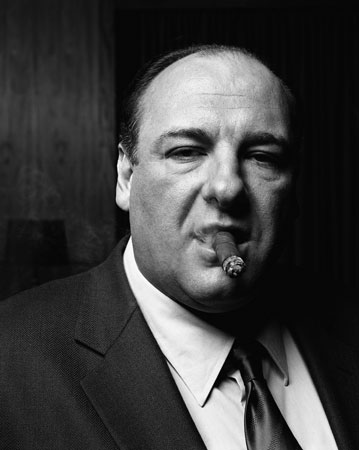
Standout episodes for this year include The Beach, The Art of War and Ordinary Death.
2. The Americans
FX
Some day there has to be a reckoning.
Philip and Elizabeth Jennings (played by Matthew Rhys and Keri Russell, respectively) have left far too much death and destruction in their wake for there to be a clean way out. Their daughter's life has been irrevocably shattered by their actions and now that she knows the truth, it takes everything that Paige (played by the immensely talented Holly Taylor) has not to suffocate under the incredible pressure she's being placed under. The long-running agent that Philip has been manipulating from the FBI since the series began has the most exciting arc of the season and Alison Wright does her best work as Martha throughout every bit of it. All of this and more sums up the best season of the one of the best shows on television, and thank God that FX is keeping it on the air because its ratings sure aren't.
One of the most interesting inclusions in recent seasons of The Americans is EST (or Erhard Seminars Training). It was initially introduced as part of a subplot where Philip was simply trying to get closer to his neighbor Stan (played by the wonderful Noah Emmerich of The Truman Show and Super 8), whom let's not forget also works for the FBI (this really has to be leading to a Walt/Hank situation a la Breaking Bad, right??). However, EST has become a refuge for Philip to explore his feelings about all of the horrible things he's done over the years. Philip has never been as committed to the cause as Elizabeth, having previously voiced interest in getting out, as well as his concerns about indoctrinating Paige into the business (as The Center is pushing) and pushing Martha into dangerous situations.
Speaking of the Center, Nina Sergeevna (played by Annet Mahendru) was on the fringes of the story for so long that at this point, it makes you wonder if she'll ever have scene with Stan or Oleg (played by Costa Ronin) again. That being said, her arc this year definitely leaves an impact, though not in the way you might expect. In addition to Nina's Russian captivity, there is Philip and Elizabeth's ongoing collaboration with Gabriel (played with reverence by Frank Langella, in a role that replaced a similar one that Dexter's Margo Martindale was fulfilling, but whom now appears far too infrequently due to other commitments). This relationship has always been complicated due to the mix of their previous close relationship, as well as the part where he frequently asks Philip and Elizabeth to do terrible things. The crux of those terrible things this year is primarily in association with Dylan Baker's character, William, and biological weapons. This storyline will push Philip and Elizabeth to their limits, in addition to everyone else they have to tangle with to keep everything afloat.
With two more seasons to go before the end, showrunners Joseph Weisberg and Joel Fields have shown that The Americans is just getting into it's best material yet; I have high hopes for the future of this Russian spy saga.
After all, as their Russian consultant has said, they are hard men.
Standout episodes this year include Chloramphenicol, The Rat, Travel Agents and Dinner For Seven.
1. Westworld
HBO
"Some people choose to see the ugliness in this world, the disarray. I choose to see the beauty. To believe there is an order to our days. A purpose."
What is consciousness?
Is it defined by a soul? Can it be manifested at will? Is it possible for a mechanical construct to make its own decisions? These are the central questions explored in the best new show of the year, Westworld.
Created by Person of Interest showrunner Jonathan Nolan, Westworld is based on a science fiction movie written and directed by Michael Crichton, also called Westworld. Much like his previous series, Nolan continues to explore artificial intelligence throughout this series in an interesting way. Crichton's original movie was released in 1973 and since then advances in technology have made it possible for his vision to be fully realized in a way that wasn't feasible in the original film. Because there is more time in a television format as opposed to film, the viewer gets to see far more of the buildup before the the robots (or Hosts) attack. This gives the audience the time necessary to sympathize with the Hosts before everything goes wrong. However, just as in the original film, this is not a normal robot uprising story.
Westworld is a theme park created by Dr. Robert Ford (played by The Silence of the Lambs' Anthony Hopkins), an incredibly ambitious man who worked with his former partner, Arnold, to create an entire world set in an old Western environment. Unlike somewhere like Disney World, instead of rides, the guests (also known as the Newcomers) are offered experiences with the Hosts. This artificial world gives them the chance to make decisions that leads many to discover who they really are. Yet, unlike the Newcomers, the Hosts have no such freedoms as is illustrated in this quote from the first episode:
"What if I told you that there were no chance encounters. That you, and everyone you know, were built to gratify the desires of the people who visit your world? The people you call the newcomers. What if I told you that you can't hurt the newcomers, but they can do anything they want to you?"
This slavery, just as in most other robot uprisings, is what leads the Hosts to question who they are and what their purpose is. We're first introduced to this world through the eyes of Dolores (played perfectly by Evan Rachel Wood), our "girl next door," who is destined to repeatedly have terrible things happen to her. Her supposed savior, Teddy (played by X-Men's James Marsden), is powerless to save her against her tormentors. Her primary assailant is the Man in Black (played ruthlessly by Ed Harris), whose only concern is finding more information regarding The Maze.
Aside from Dolores, the other Host that is given the most focus over the course of the season is Maeve (played by Thandie Newton), who has one of the most interesting arcs I've seen in any television show. The way Newton works her craft is incredible, effortlessly portraying the confusion, anger and sadness that her character experiences. Her storyline is the most unique narrative of the bunch.
In addition to the Hosts, the human cast is excellent as well. One of the men behind the scenes, Bernard (played by Hunger Games' Jeffrey Wright), is a gifted engineer who is investigating anomalies within the Hosts. Another key figure behind the veil is Theresa Cullen (played by Sidse Babett Knudsen), a senior manager whose motives are hard to predict and are constantly at odds with Dr. Ford. Finally, there's William (played by It's Always Sunny in Philadelphia and House of Cards' Jimmi Simpson), a Newcomer visiting the park with his friend.
Self-reflection is part of the reason why Westworld has captivated the world with its mysteries. Not since Lost has there been a show that has driven so much community discussion about its mysteries. In a post-Reddit world, there are so many theorists that many of the key mysteries were solved early on, which led many viewers discovering the twists far earlier than anticipated. While I kept up with some of the theories and thus knew the twists early on, I still thoroughly enjoyed the show.
This was a world that I looked forward to visiting more than any other each week. While there won't be anymore of this show until 2018, this leaves the floor open for other shows to step it up and show what they can do.
Standout episodes for this year include The Original, Tromp L'Oeil and The Bicameral Mind.
